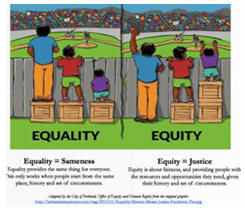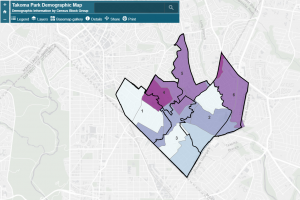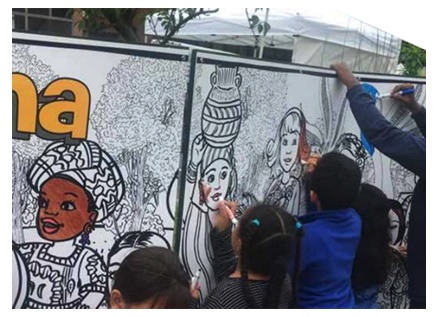Racial Equity
What is Racial Equity?
A history of racism in our country has led to current day disparities in education and job attainment, housing, and many quality of life indicators for people of color. Racial inequity today is not just overtly racist talk or action. It has become ingrained and institutionalized in policies and practices, even those we believe to be race-neutral. To address these issues, we must disrupt and unpack seemingly neutral policies and practices to see if they are contributing to inequity.
 Specifically, when we discuss racial equity, we mean the development of policies, practices, and investment in the community to reverse racial disparity trends and dismantle institutional racism. People of color should have a voice that meaningfully impacts city policies, programs, and practices. Local governments have an important role to play in ensuring that outcomes and opportunities for all people are no longer determined by race.
Specifically, when we discuss racial equity, we mean the development of policies, practices, and investment in the community to reverse racial disparity trends and dismantle institutional racism. People of color should have a voice that meaningfully impacts city policies, programs, and practices. Local governments have an important role to play in ensuring that outcomes and opportunities for all people are no longer determined by race.
Takoma Park Racial Equity Initiative Goals
- Apply a racial equity lens in a systematic way in decision-making processes with the goal of continuing to build an inclusive, equitable community for all Takoma Park residents
- Examine seemingly neutral policies and practices to determine whether they are contributing to racial inequity
- Engage in open and honest dialogue with experts on the subject of racial equity
- Explore and institute methods that have working in cities around the country to improve government policies, practices, and programs and address racial disparities
Snapshot of Takoma Park Demographics*
The majority of Takoma Park’s residents are people of color. Takoma Park has a large immigrant community, with a growing Hispanic population.
- 56.7% of Takoma Park residents are people of color: 34% are African American, 14.5% Hispanic or Latinx, 4.4% Asian, and 3.8% Other. 43.3% are white.
- 31% of the City’s population is foreign-born. Of those, 46% are naturalized U.S. citizens and 54% are not U.S. citizens.
- The majority of Takoma Park’s foreign-born residents are from Africa (43%) and Latin America (37%). 18% of the African American population are African-born.
- 34% of residents speak a language other than English at home. The prevailing languages in the City besides English are Spanish, Amharic, and French.
- The City’s Hispanic and Latino community saw a 3% increase in recent years.
- 30% of businesses in Takoma Park are minority-owned.
*Data sourced from the Housing and Economic Development Strategic Plan Data Analysis
Takoma Park Racial Equity Initiative – How It Began
As part of its annual Council Retreat in January 2017, the City Council invited a speaker from the National League of Cities’ Race, Equity, and Leadership Division to present and facilitate a dialogue about racial equity and the ways in which the Council could be more proactive in identifying and addressing racism and inequity in our community. The discussion focused on the importance of incorporating considerations of racial equity in policy and budget decisions using a disciplined approach. They examined how racism is ingrained and institutionalized in government policies and practices, even those often believed to be race neutral. By the conclusion of their discussion, the Council had made the decision to make unpacking and addressing racial equity an enduring priority for the City.
Soon after the retreat, the Council took formal action and adopted Resolution No. 2017-28 outlining their reasoning and formally establishing their commitment to systematically and deliberately apply a racial equity lens to decision-making. Effective April 5, 2017, all Council agenda items had to include racial equity considerations to inform all future decisions made by the Council. Later in 2017, the City became a member of the Government Alliance on Race and Equity (GARE) and sent all Councilmembers along with 15 senior staff to attend a day-long training hosted by GARE on racial equity in local government. This was just the beginning of our ongoing initiative.
Decision-Making Through a Racial Equity Lens: Racial Equity Considerations on Council Agenda Items
What are the Racial Equity Considerations that Council implemented through Resolution No. 2017-28? On every agenda item – voting items, work sessions, public hearings, etc. – that goes before Council for consideration, there is a section called “Racial Equity Considerations.” The purpose of the Racial Equity Considerations section is to call attention to and raise the issue of racial equity so the Council ensures it is always considered when making formal decisions. Previously, agenda items included environmental and fiscal considerations, but nothing to ensure that they were deliberately considering the potential impacts of our decisions on racial equity.
In this way, decision-makers to consider potential implications of policy and budget decisions on racial equity. For example, they now must consider who benefits and who is harmed when making decisions about whether to proceed with major projects in a certain area. When discussing whether to approve certain requests – like new sidewalks, traffic-calming, or parking permit areas – they now must be thoughtful about the systems in place for making such requests and determine where the City should be more proactive rather than reactive in addressing them.
How are the Racial Equity Considerations developed? City staff develop the initial racial equity considerations to the best of their ability during the process of creating agenda item memos. They make use of data available from the Census, Urban Institute or other similar organizations, and information collected from City events, programs, and surveys when available. The Takoma Park Planning Division created the Takoma Park Demographic Map with Census data mapped by Ward for this purpose.

When data is not available, the Racial Equity Considerations may reflect questions for the Council to consider as we work toward the goal of advancing racial equity in decisions. If it seems an item may not likely have an impact (for example, if it is an informational item like a quarterly report) or staff is not sure of the impact, then a statement instead might state, “We are unable to determine whether any group would be disproportionately impacted in a positive or negative way by this action at this time.”
When the agenda item memo is posted prior to a City Council meeting, members of the City Council and the community have opportunities to review the racial equity statement and are encouraged to contribute their thoughts. The Racial Equity Considerations enable us to ask questions about that will spur dialogue among Councilmembers and residents.
Racial Equity Initiative Milestones
The Racial Equity Considerations are just one part of an overall initiative by the City to address institutionalized racism. The City Council has been incorporating racial equity as a new priority at just about every opportunity. Important racial equity milestones for the City include:
- April 2017: The City Council passed Resolution No. 2017-28, formally adopting a racial equity framework and requiring racial equity considerations on all agenda items. Mayor Stewart and Councilman Smith drafted a blog introducing the Racial Equity Framework with links to online resources.
- March 2018: Mayor Stewart is appointed co-chair of the National League of Cities Race, Equity, and Leadership (REAL) council (through 2020).
- June 2018: Takoma Park signs the Living Cities’ Racial Equity Here commitment
- September 2018: Council developed new language in its Council Policy Priorities that made “furthering efforts related to racial equity” a key tenet of the “A Livable Community” priority.
- November 2018: The 2018 City of Takoma Park Resident Survey included questions on racial equity in service provision and focus groups comprised of African immigrants and Spanish-speaking residents
- December 2018: The Takoma Park Arts & Humanities Commission updates the Takoma Park Cultural Plan with strategies to increase the cultural diversity of City programming through 2023.
- April 2019: City contracted with the local non-profit group What’s My Bias, Inc., to conduct a series of workshops for members of City committees and other residents. A follow-up report from the first series is available here.
- September 2019: The City sent four senior staff members to join the first COG-GARE regional learning cohort to advance racial equity. They participated in a structured learning curriculum to develop a Racial Equity Action Plan to increase diversity recruitment for council-appointed members of the Council’s 16 advisory committees.
- October 2019: City Council adopted the Housing and Economic Development Strategic Plan to meet diverse housing and economic needs.
- March 2020: The City developed a COVID-19 response with targeted strategies for communities of color (see COVID-19 section below).
- June 2020: A Maryland Municipal League (MML) Public Policy Intern was hired for Summer 2020 to conduct best practices research around racial equity issues and develop recommendations.
- August 2020: A staff diversity report was included for the first time in Fiscal 2020 Adopted Budget.
- September 2020: Council passed a Resolution 2020-21 establishing a Reimagining Public Safety to Ensure Racial Justice task force comprised of subject matter experts, community leaders, and City staff.

Racial Equity Initiative – COVID-19 Response
The City is tracking infections data by race and ethnicity on the Takoma Park COVID-19 Data Dashboard. City staff and the City Council are working hard to ensure that residents and small businesses most in need are connected with resources and information to recover from this public health crisis.
For example, in cooperation with state and county leaders, the City initiated creating public health guidelines specific to renters on  contamination issues unique to multi-family buildings and landlord obligations. City staff also secured free pop-up testing with no government ID required through the Montgomery County Department of Health and has hosted testing events within walking distance of renter communities that have serviced more than 1,000 residents so far. The City Council also established a $440,000 COVID-19 Emergency Assistance Fund for direct assistance to small businesses and vulnerable families. Visit our COVID-19 Resource Page for more information.
contamination issues unique to multi-family buildings and landlord obligations. City staff also secured free pop-up testing with no government ID required through the Montgomery County Department of Health and has hosted testing events within walking distance of renter communities that have serviced more than 1,000 residents so far. The City Council also established a $440,000 COVID-19 Emergency Assistance Fund for direct assistance to small businesses and vulnerable families. Visit our COVID-19 Resource Page for more information.
Racial Equity Initiative – Project Profiles
There are many projects where City staff are developing tools and methodologies to implement the Takoma Park Racial Equity Initiative.
- Bus Shelter Improvements
- Assessment of Park Quality, Accessibility, and Race
- We Belong Here: The Takoma Park Equity Walk
- Equity in Stormwater Management
- Digital Inclusion: Circulating Chromebooks and Hotspots
- Recreation Program and Scholarship Expansion
- Visualizing Racial Disparities in Takoma Park
- Cultural Awareness
Racial Equity Initiative – Reimagining Public Safety to Ensure Racial Justice
On September 23rd, 2020, the City Council passed a resolution establishing a task force to make recommendations on ways in which the City can reform public safety policies. For the last three years, the City Council has worked to have standards for the Takoma Park Police Department that focus on a guardian rather than a warrior approach to public safety. The goals and priorities of the Council were laid out in Resolution 2017-45 and a number of policy and practice improvements have been implemented in the Department since that time. With the deaths of Breonna Taylor, George Floyd, and many other Black and brown people at the hands of police officers across the country, Mayor Stewart and Councilmembers Searcy and Seamen’s proposed the task force to further reform the City’s approach to public safety to ensure racial justice.
The task force is charged with the preparation of a report with these recommendations to be considered by the City Council in June 2021. As envisioned, the task force would make recommendations on:
- The City of Takoma Park’s policing and public safety policies and procedures, including reviewing disaggregated data on arrests, citations, and stops, to ensure that the City’s public safety approaches advance racial justice;
- Approaches to engage and empower residents, particularly groups who have been marginalized, in policing oversight and community policing practices;
- Alternative models to better address issues that are commonly correlated with police interaction, such as mental health, substance abuse, and other social service needs; and
- The reallocation of the City’s budget necessary to fund the Task Force’s recommendations.
A Long Road Ahead
Since adopting a racial equity initiative, the Council has been deliberate in how it considers potential racial equity impacts when developing priorities, revising policies and programs, and working on the budget, and will continue to build on this. We have learned through our direct involvement in various organizations focused on addressing racial equity (such as the Government Alliance on Race and Equity, Race Forward and the Center for Social Inclusion, and the National League of Cities Race, Equity and Leadership division) that most local governments working on racial equity face a variety of challenges. These include major limitations to existing data on race that can make it difficult to measure the impact of City programs. Time, budgetary and staffing constraints can also be limitations on the depth of impact analysis possible.
The process of advancing racial equity is complex and will require trial-and-error, evaluation, understanding of nuances, and lots of dialogue. It will take time, resources, education, awareness, and training. We fully expect that the road ahead will be long and not without its challenges, but we are hopeful and optimistic that we can work in a meaningful way to recognize and right some of the institutional wrongs in our community and serve as an example for others. The City Council looks forward to further conversations and community engagement as we work towards developing an approach and process that meets our objectives and works for all.
Links
- Council Resolution establishing the Racial Equity framework
- March 2017 Council blog introducing the Racial Equity framework
- “Making a Statement: Takoma Park, MD is Making Decisions Through a Racial Equity Lens”(blog featured on GARE website)
- National League of Cities: Takoma Park City Profile on Racial Equity
- Mayor Kate Stewart Appointed to Serve on National League of Cities’ Race, Equity, and Leadership Council
- July 2018 Blog regarding lessons learned to date and next steps on Takoma Junction Racial Equity Considerations
- Takoma Park Resident Survey 2018
- Takoma Park GARE Implementation Cohort Profile
- Presentation: Racial Equity in Takoma Park
- Presentation: Racial Equity Initiative…What’s Next?
Additional Racial Equity Resources
- Racial Inequities in Takoma Park, a profile compiled by the Urban Institute.
- RACE: The Power of an Illusion is a video series on systemic racism.
Video from NLC’s REAL Talk Forum - Lessons learned from community organizations leading on racial equity from The Aspen Institute.
- Guide for starting conversations on racial equity from the experts at the Annie E. Casey Foundation.
- Government Alliance for Race and Equity (GARE) & GARE Racial Equity Toolkit
- Racial Equity Resource Guide with articles, research, media strategies and training curricula.
- National League of Cities(NLC) REAL racial equity roadmap tool
Project Contact Info
Jessica Clarke
Deputy City Manager
Phone: 301-891-7202
Email: jessicac@takomaparkmd.gov
